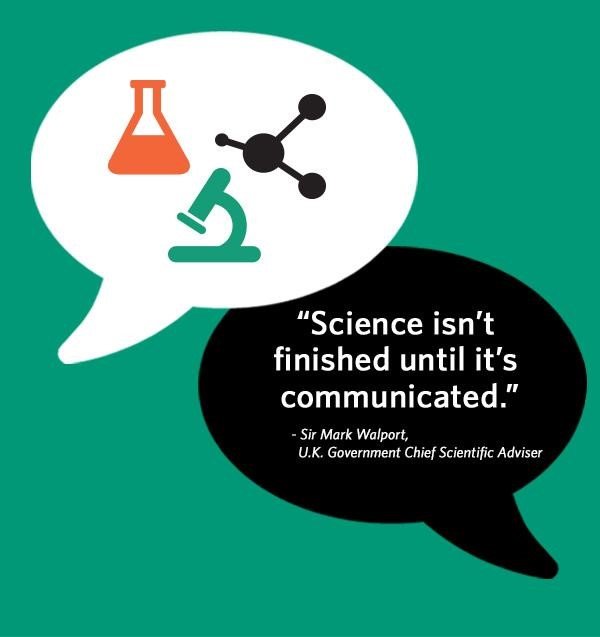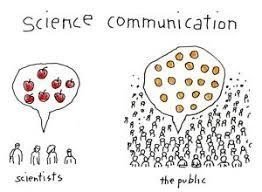The Importance of Science Communication
By Dr. Chinmaya Sadangi
In today’s world, it’s not only pursuing science, but communicating about it effectively that’s important. I completed my PhD a year ago, and throughout that time I learnt a lot about science communication. In fact, I still keep learning. And I cannot emphasize enough how important it has proven to be in my career – not just for myself, but for others too.
Communicating about science, online and ‘out there’ in world, and in doing so lifting the visibility of the science community is vital. Arguably now, more than ever. However, most of the time we tend to limit our conversations to other scientists, academics, and corporates. Yet it’s bridging the gap between the ‘science world’ and the general, non-scientist public that’s crucial.
Image adapted from http://www.bu.edu/com/science-communication/
The role of social media
Social media is a powerful tool. Most of us will use different social media platforms on a daily basis, both professionally and personally, and we can leverage these platforms to talk more about science.
For example, we can write blog posts, or post about our experiments by sharing pictures and explaining them in layman’s terms. By “layman’s terms”, I mean non-scientific language that’s accessible to a wider audience. That’s how we can enable non-scientists to understand more about our research and work.
For example, doing an immunohistochemistry (IHC) is a simple task for a life scientist, but explaining the principle behind it is important for non-scientists. Answering the “why” and “how” in simple terms is one of the best ways to spread awareness of what we’re doing in the lab to lots of different people.
We need to talk about money
Apart from the practicalities of what we do, and why it’s important, science communication also helps spread awareness about how scientists use funding, and what happens to taxpayers’ money in the ‘world of science’.
When I post about experiments, I tend to discuss the budget involved in doing a single experiment. I can then use this to inform discussions around why scientists need more money. To continue the example above, doing an IHC involves use of antibodies and they are quite expensive. Therefore, it’s important to explain why we need to use antibodies, and how much expense a single experiment or process can incur.
Your personal profile matters
Getting involved in science communication is also important for boosting your career as a scientist, or science student. It’s important to not only build your presence on various social platforms, but also in the real world.
I would highly encourage everyone to make the effort to regularly attend conferences, seminars, and workshops. Here, you can collaborate and engage with other scientists, professors, corporates, and science communicators. This will not only give you more confidence in your ability to communicate, but will help you build great networking skills. This practice will definitely open up a lot of career opportunities too.
Communicating with vendors
Lastly, I want to talk about the importance of having discussions with vendors at conferences, or the vendors who visit your lab. Recently, I was struggling with an experiment when a vendor sales executive showed up. We had a lengthy discussion about the protocol that I was using, and I figured out that I was adding something that my cells didn’t like. In my next set of experiments, I omitted that particular reagent and voila, my cells were more than happy.
When you talk to the vendors about facing difficulties in your experiments, not only does this give them the opportunity to help you if they can, but they might also be able to connect you to other experts.
Furthermore, when visiting vendors at conferences, don’t just grab their swag. Take time with them, and discuss their business and your work. You never know how many new career opportunities, or channels for communication and raising your profile you might discover right then and there.
Image adapted from http://www.mediomix.de/
To conclude, establishing your presence in the science communication world has numerous benefits: enhancing your career, building networks, increasing your knowledge portfolio, and spreading the reach of your work beyond your colleagues.
The more we talk about science to a variety of different people, the more we’re working towards building a community that helps non-scientists understand the nuances and complexities of science and its importance.
---
Dr. Chinmaya Sadangi is a postdoctoral fellow at the University of Toronto. He completed his PhD from Philipps University, Marburg, Germany. His PhD research focused on investigating the role of Toll-like receptors in epilepsy. Currently his research focus is on understanding the molecular, cellular & neural circuit changes in psychiatric and neurodegenerative disorders.
He is also a part of the eLIFE ambassador program and is a Society for Neuroscience (SfN) community leader. Outside of research, his interests are photography, traveling, and science communication.
If you’re interested in learning more about how to build your science communication skills in different fields of science, visit Chinmaya’s website and online community The Addictive Brain.
Other useful science communication resources
You may find some of our other guides useful...poster presentations, social media and more:














